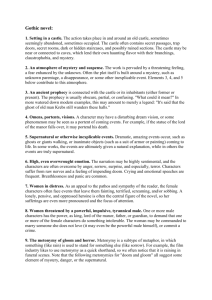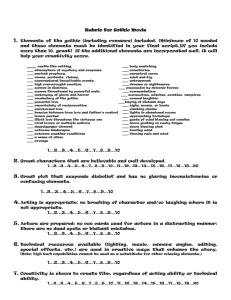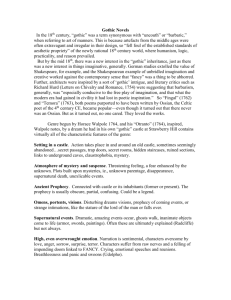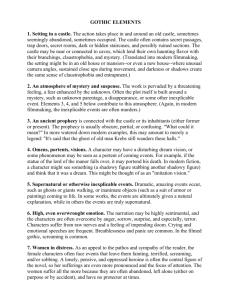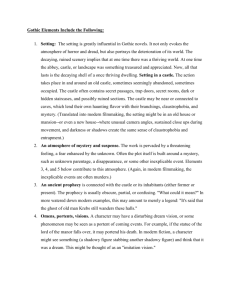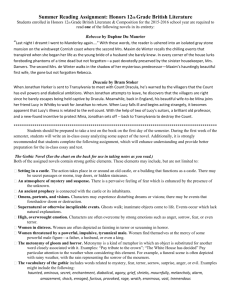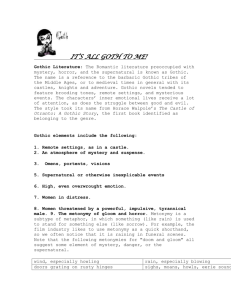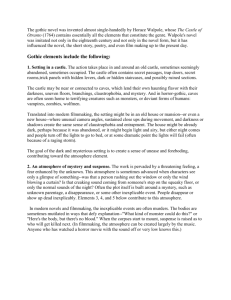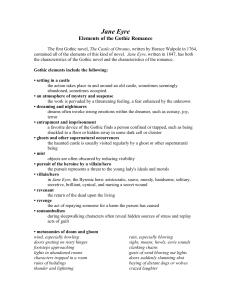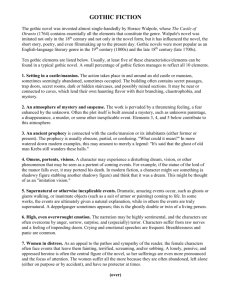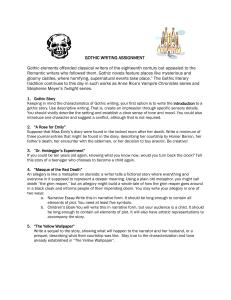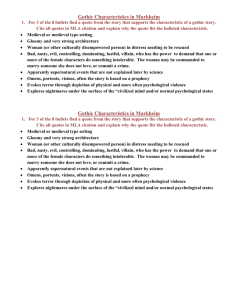Gothic Novel Elements: Short Story Writing Worksheet
advertisement
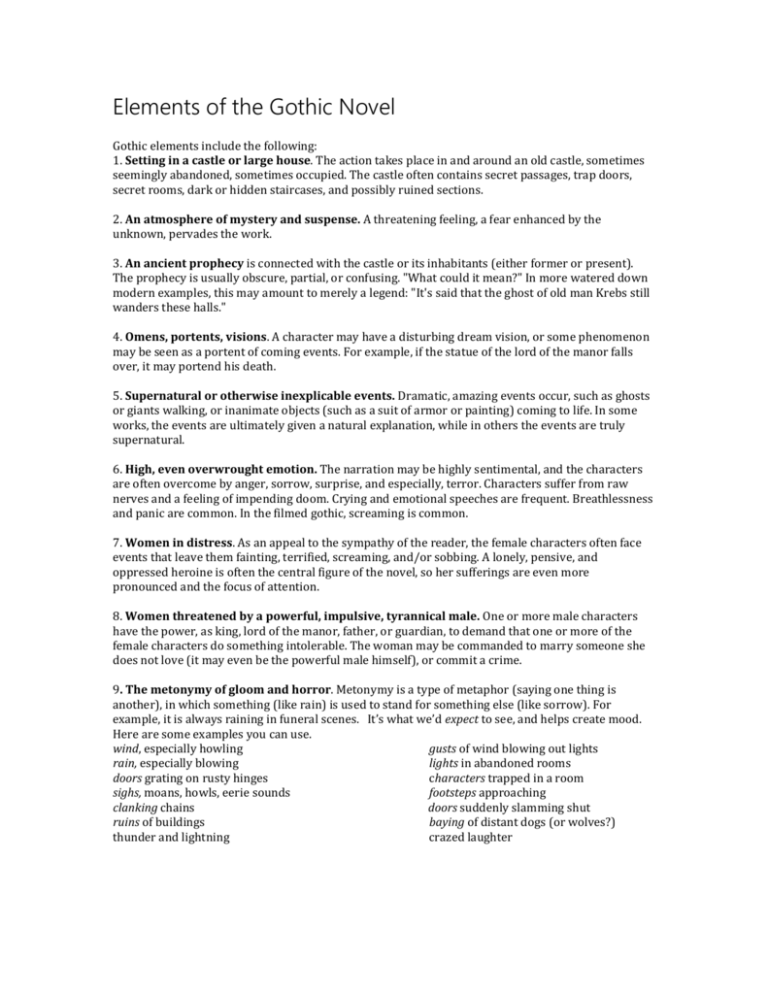
Elements of the Gothic Novel Gothic elements include the following: 1. Setting in a castle or large house. The action takes place in and around an old castle, sometimes seemingly abandoned, sometimes occupied. The castle often contains secret passages, trap doors, secret rooms, dark or hidden staircases, and possibly ruined sections. 2. An atmosphere of mystery and suspense. A threatening feeling, a fear enhanced by the unknown, pervades the work. 3. An ancient prophecy is connected with the castle or its inhabitants (either former or present). The prophecy is usually obscure, partial, or confusing. "What could it mean?" In more watered down modern examples, this may amount to merely a legend: "It's said that the ghost of old man Krebs still wanders these halls." 4. Omens, portents, visions. A character may have a disturbing dream vision, or some phenomenon may be seen as a portent of coming events. For example, if the statue of the lord of the manor falls over, it may portend his death. 5. Supernatural or otherwise inexplicable events. Dramatic, amazing events occur, such as ghosts or giants walking, or inanimate objects (such as a suit of armor or painting) coming to life. In some works, the events are ultimately given a natural explanation, while in others the events are truly supernatural. 6. High, even overwrought emotion. The narration may be highly sentimental, and the characters are often overcome by anger, sorrow, surprise, and especially, terror. Characters suffer from raw nerves and a feeling of impending doom. Crying and emotional speeches are frequent. Breathlessness and panic are common. In the filmed gothic, screaming is common. 7. Women in distress. As an appeal to the sympathy of the reader, the female characters often face events that leave them fainting, terrified, screaming, and/or sobbing. A lonely, pensive, and oppressed heroine is often the central figure of the novel, so her sufferings are even more pronounced and the focus of attention. 8. Women threatened by a powerful, impulsive, tyrannical male. One or more male characters have the power, as king, lord of the manor, father, or guardian, to demand that one or more of the female characters do something intolerable. The woman may be commanded to marry someone she does not love (it may even be the powerful male himself), or commit a crime. 9. The metonymy of gloom and horror. Metonymy is a type of metaphor (saying one thing is another), in which something (like rain) is used to stand for something else (like sorrow). For example, it is always raining in funeral scenes. It’s what we’d expect to see, and helps create mood. Here are some examples you can use. wind, especially howling gusts of wind blowing out lights rain, especially blowing lights in abandoned rooms doors grating on rusty hinges characters trapped in a room sighs, moans, howls, eerie sounds footsteps approaching clanking chains doors suddenly slamming shut ruins of buildings baying of distant dogs (or wolves?) thunder and lightning crazed laughter 10. The vocabulary of the gothic. Here are some suggestions. Sprinkle them liberally throughout your story. Mystery diabolical, enchantment, ghost, goblins, haunted, infernal, magic, magician, miracle, necromancer, omens, ominous, portent, preternatural, prodigy, prophecy, secret, sorcerer, specter, spirits, strangeness, talisman, vision Fear, Terror, or Sorrow afflicted, affliction, agony, anguish, apprehensions, apprehensive, commiseration, concern, despair, dismal, dismay, dread, dreaded, dreading, fearing, frantic, fright, frightened, grief, hopeless, horrid, horror, lamentable, melancholy, miserable, mournfully, panic, sadly, scared, shrieks, sorrow, sympathy, tears, terrible, terrified, terror, unhappy, wretched Surprise alarm, amazement, astonished, astonishment, shocking, staring, surprise, surprised, thunderstruck, wonder Haste anxious, breathless, flight, frantic, hastened, hastily, impatience, impatient, impatiently, impetuosity, precipitately, running, sudden, suddenly Anger anger, angrily, choler, enraged, furious, fury, incense, incensed, provoked, rage, raving, resentment, temper, wrath, wrathful, wrathfully Largeness (bigger than life) enormous, gigantic, giant, large, tremendous, vast Elements of Romance (if you choose) In addition to the standard gothic machinery above, many gothic novels contain elements of romance as well. Elements of romance include these: 1. Powerful love. Heart stirring, often sudden, emotions create a life or death commitment. Many times this love is the first the character has felt with this overwhelming power. 2. Uncertainty of reciprocation. What is the beloved thinking? Is the lover's love returned or not? 3. Unreturned love. Someone loves in vain (at least temporarily). Later, the love may be returned. 4. Tension between true love and father's control, disapproval, or choice. Most often, the father of the woman disapproves of the man she loves. 5. Lovers parted. Some obstacle arises and separates the lovers, geographically or in some other way. One of the lovers is banished, arrested, forced to flee, locked in a dungeon, or sometimes, disappears without explanation. Or, an explanation may be given (by the person opposing the lovers' being together) that later turns out to be false. 6. Illicit love or lust threatens the virtuous one. The young woman becomes a target of some evil man's desires and schemes. 7. Rival lovers or multiple suitors. One of the lovers (or even both) can have more than one person vying for affection. Writing a Gothic Short Story Due_______ Directions: Write a gothic short story, 2-3 pages long. You must include elements that are found in gothic fiction, but can have modern characters or setting. Fill out the following to help you create your story: *indicates an optional element Where will your story take place? Castle House Other________________________________________________ Who will be your main character(s)? Briefly describe them. Female Male *Will you have a prophecy? If so, what? *Will you have omens, portents or visions? If so, what? What supernatural events will you have in your story? Where will you put strong emotional moments? *Will you have a woman in distress? If so, who? What is her predicament? *Will you have a tyrannical male? If so, who? What metonymies will you include to create: Atmosphere? Mystery? Suspense?
